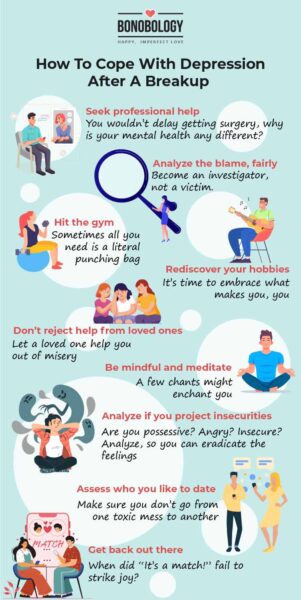Insomnia, the never-ending overthinking, hopelessness, fatigue, and an inexplicable desire to be left alone in a dark room — depression after a breakup can get the better of any of us. Even though the symptoms are indisputably soul-crushing, perhaps what’s more infuriating is when a friend crassly says, “Just cheer up! Don’t be so sad.”
To the outsider, it may look like a ridiculous state of affairs when all you want to do is avoid company and stay indoors. You know what you’re going through, and you know exactly how hard it is to heal a broken heart and move on.
It may even seem impossible, but we’re here to tell you that severe depression after a breakup is just a roadblock on the way of you finding yourself again. To help you cope with depression after a breakup, we’ve compiled a list of tips backed by expert psychotherapist Dr. Aman Bhonsle (Ph.D., PGDTA), who specializes in relationship counseling and Rational Emotive Behavior Therapy.
Can A Breakup Affect Your Mental Health?
Table of Contents
Before we dive into how to navigate depression after a breakup, it’ll be helpful to take a look at just how breakups can affect your mental health. When some people around you end up saying things like, You’re not depressed, you’re just sad”, or, “Come outside and you’ll feel better,” it’s possible you may even end up doubting your own reaction to the breakup.
Should you have let it get to you this much? Do breakups even cause depression and mental health issues? “Yes, they absolutely can,” says Dr. Bhonsle.
“After a breakup, we start doubting our ability to gel with other human beings, and then that can lead to a lot of self-projection. You start questioning your own likability, which is similar to having an identity crisis. You don’t feel needed, you question if you’re liked and you’re made to feel redundant.”
“A lot of people don’t know who they are when they are not in relationships, which is why a breakup can be more challenging. As a result, people may go through dramatic weight loss or dramatic weight gain, excessive drinking, or a general loss of interest in things that usually would’ve perked them up. All these symptoms can point towards depression, social anxiety, or other similar problems,” he adds.
Breakups are traumatic, and the bottomless pit of self-doubt they can send you into may seem impossible to climb out of. The reason behind the breakups can also play a significant role in how much grief they bring.
Infidelity in a relationship, or emotional abuse, the layers of which you seem to uncover with each passing day, often bring a heightened sense of depression after a breakup. To sum it up, the answer to “Can you get depression from a broken heart?” is “Yes”, and here’s what you should do about it.
Related Reading: Practical Steps To Deal With Depression – Our Panel Of Therapists Tell You
Coping With Depression After A Breakup – 9 Expert-backed Tips
Depression after a breakup is not uncommon to see, especially as it can affect every aspect of your life, leading to slower recovery or no recovery at all. However, by taking measures to work on your depression, you can pave the way towards finding joy in the little things again.
While it may seem impossible to convince yourself to get out of bed, it’s extremely important you make use of the following tips so you don’t let your depression and loneliness after a breakup define you. Let’s get right to it then:
1. Seek professional help
First and foremost, if you’re having thoughts about mortality or suicide, consult professional help immediately. Even if you’re not suicidal, Dr. Bhonsle tells us how going to a professional therapist can help you get over depression after breakups
“When people rely on friends instead of mental health professionals, it may end up making their pain worse. “This too shall pass”, “many fish in the sea”, “you have to get under someone to get over someone”, and other such bad, cliched, token advice does more harm than good. They sound poetic, but are of no practical value.
“Your family or friends may have an agenda and may tell you things you want to hear. A therapist has no mandate to impress you. Therapists will help you get rid of this psychological germ that has infected you by telling you what’s best for you and what you need to hear, not what you want to hear,” says Dr. Bhonsle
if you’d like to deal with depression after a breakup with the help of a professional, Bonobology has a multitude of experienced therapists willing to help you get through this difficult time in your life, including Dr. Aman Bhonsle himself.
2. Don’t blame yourself entirely, but don’t adopt the victim mentality either
Though it’s important to not completely blame yourself for the breakup and not feel sorry for yourself, Dr. Bhonsle tells us that assuming you did nothing wrong can be just as detrimental to any future relationships and may even halt your healing at that moment.
“It’s quite possible that you see things purely through a black and white way lens while going through a rough breakup. The person you want to blame becomes the villain, and you convince yourself that everything that went wrong was solely because of them. Since no relationship is that black and white, there might well be things you have done too. But you may not be willing to see it, because that shatters the image of martyrdom that you’re looking to build for yourself.
“Because martyrdom is cute, right? When you look at yourself as a victim of bad times, there’s almost a certain comforting quality to it. ‘Everything bad happened to me, and therefore I need to be rescued and pitied’.”
“A breakup is nothing but a frustration of agendas. Two people have an agenda for shared companionship, and you’re trying to cook this recipe for happiness through the lens of companionship. When the dish turns out raw or partially cooked or inadequately seasoned, the ingredients could’ve been missing from either side, not just one. Become an investigator, not a martyr”, says Dr. Bhonsle.
Accepting blame, addressing what you did wrong and taking responsibility for it won’t just help you heal a broken heart and move on, it’ll also help you become a better person in the future.
Related Reading: 8 Signs Your Friend Is In Depression and 6 Ways You Can Help
3. The age-old way of tackling depression after a breakup: exercise
While your friends telling you, “Come out for a hike, let’s run our troubles away” might seem the most obnoxious idea in the beginning, they may actually be on to something. For starters, exercise may improve your sex drive.
Countless studies have shown that when exercise is adopted with therapy, it can greatly curb signs and symptoms of depression amongst patients. Harvard health goes as far as to claim that exercise alone can be as good as antidepressants in some cases.
If you’re struggling with depression after breakup with a narcissist, it’s possible they may have used manipulation tactics to bring down your self-esteem. Multiple studies claim there’s a direct correlation between physical activity and self-esteem.
Pumping some iron or hitting the treadmill to tackle severe depression after breakup may just end up working wonders for you, and it’ll get you in shape as well. Who knows, the next partner who comes along in your life won’t be able to get over the muscles all those push-ups helped build.
4. Rediscover the hobbies you were into
Dr. Bhonsle agrees that forcing yourself to not think about the breakup and your ex might be too hard to do sometimes, even when you’ve blocked your ex everywhere. Which is exactly why blowing off the layer of dust on the books you’ve collected or that guitar you haven’t touched in ages is a good idea.
By throwing yourself into your hobbies or work, you’ll make sure you don’t get time to overanalyze the negative emotions and the breakup. “An anxious mind needs a good project,” says Dr. Bhonsle, and sometimes distracting yourself with work and hobbies is all it takes to be better able to deal with depression and loneliness after a breakup.

5. Don’t reject help from loved ones
When you’re suffering from severe depression after a breakup, an inexplicable feeling makes you reject help from all those around you, even if they’re begging to be let into your life. You know you’ll probably benefit from a helping hand, but for some reason, reaching out to someone seems like you’ll have to go through an inferno first.
“If someone genuinely wants to talk you through the situation, someone who’s mature, who has a deep understanding of you as a person, then one should definitely have an open mind at least, and accept help,” says Dr. Bhonsle.
“If you believe no one can help you, then guess what, you’re right. It’s almost as if you’ve turned the EMP on, blocking anything a friend or even a psychiatrist tells you. Since that won’t help you deal with depression after a breakup, you must be willing to let someone in,” he adds.
6. Practice mindfulness and meditation
We know, we know, “mindfulness helps relationships and everything else”, advice like this may be prevalent to the point where it seems annoying. Meditation always seems to be this sacred, ancient cure-all that will suddenly fix all your problems. Especially in recent years, when this “trend” seems to have caught on, spreading like wildfire amongst the “woke”.
While it may seem crazy how closing your eyes and thinking about nothing will help you get through severe depression after a breakup, studies have shown that practicing transcendental meditation has previously helped those with depression.
You may not be able to meditate all your problems away, but practicing mindfulness and meditating for just 10 minutes a day will help put you in a better state of mind.
Related Reading: How My Partner Helped Me Deal With Depression
7. Do you project your insecurities during a relationship?
Whether battling depression 1 month after a breakup or 1 week after it, it’s important to analyze the insecurities you might have projected in your relationship. Doing so will help you get to the bottom of what might have caused the failed status of the relationship and the insecurities you need to work on, which, in turn, will help improve your self-worth.
“Do you tend to be possessive? Or do you talk too much about your problems? Perhaps there’s a slight hint of sexism in the way you deal with someone. These things need to be investigated because we don’t want to make the same mistakes again,” says Dr. Bhonsle.
By investigating, instead of wallowing in sadness, you’ll be able to get to the bottom of multiple behavioral patterns that will not only help you avoid similar mistakes in the future but increase your sense of self-awareness. The common causes of insecurities can end up telling you a lot about you you didn’t previously know.
8. Assess your dating habits
“If I figure out I am allergic to peanuts, then I can avoid foods that have peanuts in them, right?” chuckles Dr. Bhonsle, telling us why we need to figure out the kind of partners we’re allergic to so we can avoid those nasty rashes in the future.
“It may not immediately assuage your grief, but it will prevent you from falling into similar traps. It happens very subliminally, but girls might sometimes end up choosing guys who protect them just like their father would. Guys might sometimes choose girls similar to their mothers, which might not necessarily be a good thing,” he adds.
Are you going for people who are not good for you, simply because that’s the kind of love you witnessed/received while growing up? To heal a broken heart and move on doesn’t only have to do with distracting yourself, sometimes you’ve got to analyze why you got into the situation you did in the first place, so that you can make sure you never touch those peanuts again.

9. Everyone’s favorite “beat depression after a breakup” advice: get back out there
No, this doesn’t mean you should immediately hop onto a rebound relationship or “get under someone to get over someone” the first chance you get. By getting back out there, we mean you should slowly test the waters again, indulge in what feels nice, and also see if you meet someone you like talking to.
If you’re dealing with depression 1 month after breakup, getting “back out there” might be the last thing on your mind, and for good reason too. There’s no reason to rush this; take it at your own pace, but setting up a new Tinder profile might give you a boost of validation that’ll definitely get the dopamine flooding in your brain again.
Severe depression after breakup can turn your world upside down, often making it seem as though there’s no hope and you’ll never find love again. At the moment, you may even truly believe that. But once you successfully learn to tackle depression and loneliness after a breakup, there’s no reason why you won’t get better. You’ll learn to love again and you’ll learn to be loved again. Granted, breakups are traumatic, but at the end of the day, hardships are what shape the stoic in you, leaving you more capable of dealing with the adversities life will throw your way.
Ask Our Expert
You must be Logged in to ask a question.


